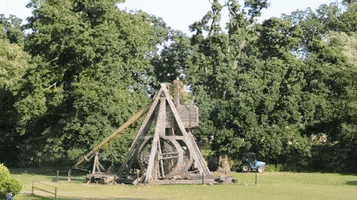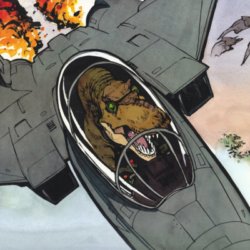The late Bronze Age collapse
-
Montegriffo

- Posts: 18852
- Joined: Wed Nov 30, 2016 7:14 am
The late Bronze Age collapse
Interesting podcast with some great theories about the sea people and the collapse of many of the great civilisations around 13-1200 BC.
Quick synopsis.
The sea people were not necessarily one people, they could in fact have been climate refugees from many areas made desperate from famine caused by the massive eruption of Mount Hekla in Iceland.
7 cubic kilometers of ash were thrown up into the atmosphere causing the Sun to be blocked out and nearly 20 years of drought and crop failures.
The great civilisations of the time were reliant on international trade and dependant on each other so as each one fell the ripple effect weakened each of the others in turn.
Also, the more abundant iron and steel technologies starting to develop enabled smaller nations to compete militarily with the large civilisations whose monopoly of bronze due to the rarity of tin had previously advantaged them.
The new steel weapons and their increase in availability also decreased the power of the state over the people and much of the collapse may have been caused by revolutions brought on by famine rather than invasion.
Plenty of interesting points and a good way to fill an hour of your time during the lockdown.
Death, death, to the IDF.


-
SuburbanFarmer

- Posts: 25488
- Joined: Wed Nov 30, 2016 6:50 am
- Location: Ohio
-
Montegriffo

- Posts: 18852
- Joined: Wed Nov 30, 2016 7:14 am
Re: The late Bronze Age collapse
It looks like a good series of TV podcasts. I've just watched the episode on the Greenland Norse collapse which was also a good watch.
There are also TV episodes on Roman Britain, The Mayans and the Khmer Empire.
https://www.youtube.com/channel/UCT6Y5J ... MivpKgVXew
There are another 5 audio-only podcasts under the same title (fall of empires) which take in Easter Island, the African Songhai Empire, the Sumerians, the Aztecs and China's Han dynasty.
There are also TV episodes on Roman Britain, The Mayans and the Khmer Empire.
https://www.youtube.com/channel/UCT6Y5J ... MivpKgVXew
There are another 5 audio-only podcasts under the same title (fall of empires) which take in Easter Island, the African Songhai Empire, the Sumerians, the Aztecs and China's Han dynasty.
Death, death, to the IDF.


-
Speaker to Animals

- Posts: 38685
- Joined: Wed Nov 30, 2016 5:59 pm
Re: The late Bronze Age collapse
That's weird. I was listening to that podcast recently.
-
Montegriffo

- Posts: 18852
- Joined: Wed Nov 30, 2016 7:14 am
Re: The late Bronze Age collapse
Let me guess, Mayans or Aztecs.Speaker to Animals wrote: Thu May 07, 2020 3:18 pm That's weird. I was listening to that podcast recently.
What did you make of it? I only came by it today but have enjoyed both of the episodes I watched.
It covers most of the issues raised in ''Collapse'' by your favourite historian Jared Diamond in the Greenland Norse episode. JD actually got a mention concerning the lack of archaeological evidence of fishbones found at settlements but his theory about them not eating much fish was disregarded
as the bones are too small to last without breaking down or being blown away by the wind.
Death, death, to the IDF.


-
Speaker to Animals

- Posts: 38685
- Joined: Wed Nov 30, 2016 5:59 pm
Re: The late Bronze Age collapse
I started with the Bronze Age Collapse. I did listen to the Mesoamerican ones, but I fell asleep by then.Montegriffo wrote: Thu May 07, 2020 3:40 pmLet me guess, Mayans or Aztecs.Speaker to Animals wrote: Thu May 07, 2020 3:18 pm That's weird. I was listening to that podcast recently.
What did you make of it? I only came by it today but have enjoyed both of the episodes I watched.
It covers most of the issues raised in ''Collapse'' by your favourite historian Jared Diamond in the Greenland Norse episode. JD actually got a mention concerning the lack of archaeological evidence of fishbones found at settlements but his theory about them not eating much fish was disregarded
as the bones are too small to last without breaking down or being blown away by the wind.
Jared Diamond's thesis is disproved by the fact that corn was found all over the Americas when we came here. There was obviously trade north-south.
-
Montegriffo

- Posts: 18852
- Joined: Wed Nov 30, 2016 7:14 am
Re: The late Bronze Age collapse
I'm not sure he ever made an argument that there was no North-South trade in the America's. He pointed out that East-West migration of crops and ideas in Eurasia was made easier due to similar growing conditions in terms of hours of daylight and herd immunity to the same diseases caught from shared livestock - smallpox, TB etc.Speaker to Animals wrote: Thu May 07, 2020 3:42 pmI started with the Bronze Age Collapse. I did listen to the Mesoamerican ones, but I fell asleep by then.Montegriffo wrote: Thu May 07, 2020 3:40 pmLet me guess, Mayans or Aztecs.Speaker to Animals wrote: Thu May 07, 2020 3:18 pm That's weird. I was listening to that podcast recently.
What did you make of it? I only came by it today but have enjoyed both of the episodes I watched.
It covers most of the issues raised in ''Collapse'' by your favourite historian Jared Diamond in the Greenland Norse episode. JD actually got a mention concerning the lack of archaeological evidence of fishbones found at settlements but his theory about them not eating much fish was disregarded
as the bones are too small to last without breaking down or being blown away by the wind.
Jared Diamond's thesis is disproved by the fact that corn was found all over the Americas when we came here. There was obviously trade north-south.
He also talked about geographic barriers to North-South migration in Africa and a lack of resistance to tropical diseases in European settlers.
Interestingly, the Greenland episode mentioned Norse accounts of finding local wheat varieties in the far North of the American continent which Diamond had dismissed and had cited as one of the reasons for the lack agricultural development.
Guns, germs and steel is wrong about a lot of what he says concerning America and Collapse gets Easter Island very wrong but I still like his overall ideas.
There has been a lot of good research into Easter Island since he wrote Collapse and the previously accepted opinion that they caused their own decline through mismanagement of the environment has been largely disproved.
Death, death, to the IDF.


-
Speaker to Animals

- Posts: 38685
- Joined: Wed Nov 30, 2016 5:59 pm
Re: The late Bronze Age collapse
The principal argument in his thesis was that the geographic arrangement of the two landmasses helped our ancestors while sabotaging their ancestors. His argument was that trade was not possible north-south since crops would be adapted only to certain latitudes, whereas in Eurasia a crop domesticated in Asia would likely grow well in Europe at a similar latitude. But what he misses here is that crops will adapt to a region as you sow and harvest them year after year, and most of these crops still grow fine in most latitudes (i.e. maize and even wheat). That maize was found in North and South America shows that trade was alive and well.Montegriffo wrote: Thu May 07, 2020 4:05 pmI'm not sure he ever made an argument that there was no North-South trade in the America's. He pointed out that East-West migration of crops and ideas in Eurasia was made easier due to similar growing conditions in terms of hours of daylight and herd immunity to the same diseases caught from shared livestock - smallpox, TB etc.Speaker to Animals wrote: Thu May 07, 2020 3:42 pmI started with the Bronze Age Collapse. I did listen to the Mesoamerican ones, but I fell asleep by then.Montegriffo wrote: Thu May 07, 2020 3:40 pm
Let me guess, Mayans or Aztecs.
What did you make of it? I only came by it today but have enjoyed both of the episodes I watched.
It covers most of the issues raised in ''Collapse'' by your favourite historian Jared Diamond in the Greenland Norse episode. JD actually got a mention concerning the lack of archaeological evidence of fishbones found at settlements but his theory about them not eating much fish was disregarded
as the bones are too small to last without breaking down or being blown away by the wind.
Jared Diamond's thesis is disproved by the fact that corn was found all over the Americas when we came here. There was obviously trade north-south.
He also talked about geographic barriers to North-South migration in Africa and a lack of resistance to tropical diseases in European settlers.
Interestingly, the Greenland episode mentioned Norse accounts of finding local wheat varieties in the far North of the American continent which Diamond had dismissed and had cited as one of the reasons for the lack agricultural development.
Guns, germs and steel is wrong about a lot of what he says concerning America and Collapse gets Easter Island very wrong but I still like his overall ideas.
There has been a lot of good research into Easter Island since he wrote Collapse and the previously accepted opinion that they caused their own decline through mismanagement of the environment has been largely disproved.
-
Montegriffo

- Posts: 18852
- Joined: Wed Nov 30, 2016 7:14 am
Re: The late Bronze Age collapse
Well, I think his point about Eurasia having more advantages due to having a similar latitude along its length is valid.Speaker to Animals wrote: Thu May 07, 2020 4:09 pmThe principal argument in his thesis was that the geographic arrangement of the two landmasses helped our ancestors while sabotaging their ancestors. His argument was that trade was not possible north-south since crops would be adapted only to certain latitudes, whereas in Eurasia a crop domesticated in Asia would likely grow well in Europe at a similar latitude. But what he misses here is that crops will adapt to a region as you sow and harvest them year after year, and most of these crops still grow fine in most latitudes (i.e. maize and even wheat). That maize was found in North and South America shows that trade was alive and well.Montegriffo wrote: Thu May 07, 2020 4:05 pmI'm not sure he ever made an argument that there was no North-South trade in the America's. He pointed out that East-West migration of crops and ideas in Eurasia was made easier due to similar growing conditions in terms of hours of daylight and herd immunity to the same diseases caught from shared livestock - smallpox, TB etc.Speaker to Animals wrote: Thu May 07, 2020 3:42 pm
I started with the Bronze Age Collapse. I did listen to the Mesoamerican ones, but I fell asleep by then.
Jared Diamond's thesis is disproved by the fact that corn was found all over the Americas when we came here. There was obviously trade north-south.
He also talked about geographic barriers to North-South migration in Africa and a lack of resistance to tropical diseases in European settlers.
Interestingly, the Greenland episode mentioned Norse accounts of finding local wheat varieties in the far North of the American continent which Diamond had dismissed and had cited as one of the reasons for the lack agricultural development.
Guns, germs and steel is wrong about a lot of what he says concerning America and Collapse gets Easter Island very wrong but I still like his overall ideas.
There has been a lot of good research into Easter Island since he wrote Collapse and the previously accepted opinion that they caused their own decline through mismanagement of the environment has been largely disproved.
I also think that trade was far more established here and goes back a lot further in time. Even during the neolithic era, there is strong evidence of widespread trade. The Amesbury Archer, buried near Stonehenge, had burial goods from as far afield as the Alps and he goes back nearly 4500 years. The oldest known long distance trade was between Mesopotamia and the Indus valley in Pakistan over 5000 years ago.
The nearby (to me) 7th century burial of Rædwald in Sutton Hoo was found to have small black beads which were analysed and found to have come from Afghanistan. I don't know whether there is the same evidence for trade routes as old or as far-reaching in the Americas as there are in Eurasia.
Death, death, to the IDF.


-
Speaker to Animals

- Posts: 38685
- Joined: Wed Nov 30, 2016 5:59 pm
Re: The late Bronze Age collapse
There was just as much trade in the Americas. There was even more cultural exchange. For instance, civilizations in what is today the Peruvian coast had contact and even settlements on the west coast of what is Mexico today. Ceramics technology was traded from Peru to Mesoamerica via the Mayans, and then exported up into Mississippian cultures. Maize was traded from the bottom of South America up into modern-day Canada. The Mesoamerican ballgame was being played the natives in what we call Puerto Rico today and even some tribes in Florida.Montegriffo wrote: Thu May 07, 2020 4:34 pmWell, I think his point about Eurasia having more advantages due to having a similar latitude along its length is valid.Speaker to Animals wrote: Thu May 07, 2020 4:09 pmThe principal argument in his thesis was that the geographic arrangement of the two landmasses helped our ancestors while sabotaging their ancestors. His argument was that trade was not possible north-south since crops would be adapted only to certain latitudes, whereas in Eurasia a crop domesticated in Asia would likely grow well in Europe at a similar latitude. But what he misses here is that crops will adapt to a region as you sow and harvest them year after year, and most of these crops still grow fine in most latitudes (i.e. maize and even wheat). That maize was found in North and South America shows that trade was alive and well.Montegriffo wrote: Thu May 07, 2020 4:05 pm
I'm not sure he ever made an argument that there was no North-South trade in the America's. He pointed out that East-West migration of crops and ideas in Eurasia was made easier due to similar growing conditions in terms of hours of daylight and herd immunity to the same diseases caught from shared livestock - smallpox, TB etc.
He also talked about geographic barriers to North-South migration in Africa and a lack of resistance to tropical diseases in European settlers.
Interestingly, the Greenland episode mentioned Norse accounts of finding local wheat varieties in the far North of the American continent which Diamond had dismissed and had cited as one of the reasons for the lack agricultural development.
Guns, germs and steel is wrong about a lot of what he says concerning America and Collapse gets Easter Island very wrong but I still like his overall ideas.
There has been a lot of good research into Easter Island since he wrote Collapse and the previously accepted opinion that they caused their own decline through mismanagement of the environment has been largely disproved.
I also think that trade was far more established here and goes back a lot further in time. Even during the neolithic era, there is strong evidence of widespread trade. The Amesbury Archer, buried near Stonehenge, had burial goods from as far afield as the Alps and he goes back nearly 4500 years. The oldest known long distance trade was between Mesopotamia and the Indus valley in Pakistan over 5000 years ago.
The nearby (to me) 7th century burial of Rædwald in Sutton Hoo was found to have small black beads which were analysed and found to have come from Afghanistan. I don't know whether there is the same evidence for trade routes as old or as far-reaching in the Americas as there are in Eurasia.
There just wasn't anything super developed like silk road. But that's a relatively recent thing anyway. The kind of trade he was talking about, going back to the neolithic, is just random exchange of seeds and animals that creates a chain of trade across the landmass. Americans had that too.
Honestly, I think what sabotaged them here was that the religions of the Americas were really fucked up and facilitated things like the Mesoamerican star wars, where cities would wage perennial wars of extermination to capture each other's portals to the otherworld. All this political correctness has people not focused on the fact that culture matters and the culture was completely fucked up.